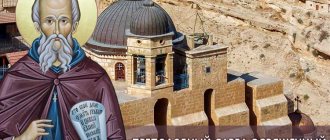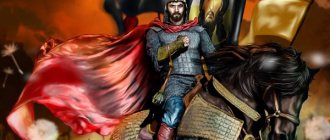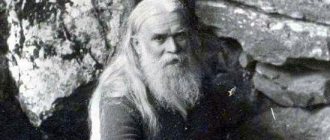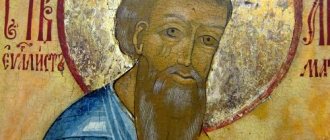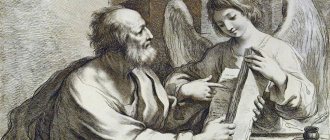Hieromartyr Antipas of Pergamon, bishop
The life and works of the apostles - Holy Hieromartyr Antipas of Pergamon
Brief Life of the Hieromartyr Antipas, Bishop of Pergamon
Hieromartyr Antipas, a disciple of the holy Apostle John the Theologian (September 26), was the bishop of the Pergamon Church during the reign of Emperor Nero (54–68).
At that time, by order of the emperor, everyone who did not sacrifice to idols was executed or expelled. Then the holy Apostle John the Theologian was imprisoned on the island of Patmos in the Aegean Sea, to whom the Lord revealed the future destinies of the world and the Holy Church.
“And write to the Angel of the Church of Pergamum: Thus says He who has a sharp sword on both sides: I know your works, and that you live where the throne of Satan is, and that you keep My Name, and have not denied My faith even in those days in which you, where Satan dwells, My faithful witness Antipas was killed” (Rev. 2:12-13).
Saint Antipas, by his example, firm faith and tireless preaching about Christ, achieved that the inhabitants of Pergamon began to shy away from sacrifices to idols. The pagan priests reproached the bishop for turning the people away from worshiping their native gods, and demanded that he stop preaching about Christ and sacrifice to idols.
Saint Antipas calmly replied that he would not serve the demon gods who were fleeing from him, a mortal man, that he worshiped and would worship the Lord Almighty, who created everything, and His Only Begotten and Consubstantial Son and the Holy Spirit. The priests objected that their gods had existed for a long time, but Christ had appeared recently and was crucified under Pilate as a villain. The saint replied that the pagan gods were created by the hands of people and all the legends about them are full of lawlessness and vices. He firmly professed faith in the Son of God, incarnate of the Blessed Virgin.
The enraged priests dragged the holy martyr Antipas to the temple of Artemis and threw him into a red-hot copper ox, where sacrifices to idols were usually thrown. The holy martyr loudly prayed to God in a red-hot furnace, asking him to accept his soul and strengthen the faith of Christians. He went to the Lord calmly, as if falling asleep († c. 68).
At night, Christians took the body of the Hieromartyr Antipas, untouched by fire, and buried it with honor in Pergamum. The tomb of the holy martyr became a source of miracles and healings from various diseases. They especially resort to the holy martyr Antipas for toothaches.
The Complete Life of the Hieromartyr Antipas, Bishop of Pergamon
Hieromartyr Antipas (1st century AD) was one of the disciples of the holy Apostle and Evangelist John the Theologian, the closest disciple and confidant of the Lord, and headed the episcopal see in the city of Pergamum in Asia Minor. The Lord placed him in this ministry, seeing the greatness of his spirit, and imparted to him grace-filled gifts that had the power to withstand the very chief of the spirits of wickedness in high places in one of his earthly inheritances.
At the time of the appearance of Saint Antipas in Pergamon, this city was the third largest after such cities of the ancient world as Rome and Alexandria. Pergamon was famous for its magnificent architecture, a library that rivaled that of Alexandria, a sculpture museum, scientific schools and a major center for theatrical art.
The Pergamon Altar - the altar of Zeus - is one of the grandiose structures of the Ancient World. The library of Pergamon contained numerous manuscripts on medicine, because the city was considered the center of medical science and healing. The townspeople erected a hospital outside the city walls and decorated it with a meaningful inscription: “In the name of the gods of death, entry is prohibited.” The sick took baths in bronze-trimmed pools, drank healing waters, and the hands of skilled massage therapists and fragrant rubs restored strength to weakened muscles. In the health resort you could relax in the shade of the galleries, sitting on stone benches or leaning against a column. Special horns were hidden under the arches here, and through them the voices of invisible psychotherapists were heard. They convinced patients to forget their illnesses, not to think about sorrows and physical suffering, and to suppress the disease with the power of their own spirit.
The palaces and temples of Pergamon were built with grace and luxury. There was a huge theater here, the size and architecture of which resembled a stadium, where, in the spirit of the times, cruel games were held - gladiator fights.
In the center of the city there was a pagan temple of Artemis, the goddess of the hunt, known for her cunning, who was revered by the locals more than other gods.
With the arrival of Bishop Antipas in Pergamum, the demons could not withstand his spiritual power and fled from the city. The elder’s prayer burned them like fire and drove them away, and his fiery word and holiness of life converted many pagans to Christ. The inhabitants of Pergamum stopped making sacrifices in pagan temples. Having neither the strength nor the power to tempt the saint, the demons began to appear to their earthly servants - the magicians and priests, complaining that they could no longer smell the sacrificial incense or hear praise, since the leader of the Christians was driving them away.
Angry pagans grabbed the saint and brought him to the temple. “Are you not that Antipas who does not allow any of the gods to get enough of the sacrificial fat? Because of you, the gods left our city and no longer want to protect it! Obey our laws, or you will suffer a worthy punishment,” the ruler demanded. “If your gods themselves cannot punish for the insult caused to them and, having recognized themselves as defeated by one old man, they themselves seek your help, then how can they protect the city?” - Antipas answered.
In a rage, the pagan priests dragged the holy man to the temple of Artemis and threw him into a red-hot copper ox, in which they made sacrifices. Saint Antipas prayed for a long time in a red-hot will, and then peacefully surrendered his spirit into the hand of God, as if falling asleep. The Christians took his holy relics and buried them with honor in Pergamum, and from them flowed myrrh, which healed all diseases. Since then, believers, resorting to the Hieromartyr Antipas as a quick helper in sorrows and illnesses, have invariably received consolation and healing. He also has the special grace of being an ambulance for those suffering from dental diseases.
The prayer cover of the Hieromartyr Antipas is especially necessary in our apostatic times. In his dying prayer, the saint asked the Lord, “so that those who will live after me may become partakers of His Grace.” Today he intercedes for Christians, exposing the hidden machinations of the evil one and guiding them on the path of salvation. Being a seer of God's destinies and a conqueror of demons during his lifetime, Saint Antipas has the special grace to protect from errors and protect from demonic temptations of the last times.
See also: “ The Suffering of the Holy Hieromartyr Antipas, Bishop of Pergamon” as narrated by St. Demetrius of Rostov.
Orthodox prayer - Orthodox book
Saint Antipas lived in the 1st century. and served as bishop of the Pergamon Church in Asia Minor. In the Revelation of the Apostle John the Theologian it is said about the Hieromartyr Antipas: “among you, where Satan lives, My faithful witness Antipas was killed” (Rev. 2:13). These words give some idea of the morals of the idolaters - the inhabitants of Pergamon. Antipas, who preached Christian teaching among them, was accused by the pagan priests of the fact that because of him their “gods” left Pergamon without their protection. The ruler of the city demanded that Antipas renounce Christ, but he remained faithful to the Lord. Then he was thrown inside a red-hot copper bull, where, after much torment, the sufferer died with a prayer on his lips (about 68). The saint was buried in Pergamon, and in the 5th century. a temple was built over his grave. With the myrrh-streaming relics of the martyr, many healings of the sick took place. The tradition of addressing the holy martyr Antipas as a saint whose prayers help with toothache was adopted from Greek sources by Russian liturgical books. They pray to him for healing from other bodily illnesses, mental ailments, for the granting of health, help in all good deeds, a quiet and serene life in piety and purity, and also for much more.
Prayer to the Hieromartyr Antipas, Bishop of Pergamon
O glorious Hieromartyr Antipos, quick helper to Christians in illness! I believe with all my soul and thoughts that the Lord has given you the gift of healing the sick and strengthening the weak. For this reason, to you, as a blessed doctor of diseases, I am weak (or infirm) and I come running to your venerable image with reverence kissing (or kissing), I pray: by your intercession from the Heavenly King, ask me, who is sick (or sick), for healing from dental problems that are depressing me illness, even if I am unworthy (or unworthy) of you, my most gracious father and ever-present intercessor; but you, being an imitator of God’s love for mankind, make me worthy (or worthy) of your intercession through my conversion from evil deeds to a good life, heal the ulcers and scabs of my soul and body with the grace abundantly given to you, grant me health and salvation and good haste in everything So, having lived (or lived) a quiet and silent life in all piety and purity, I will be deemed worthy to glorify the all-holy name of the Father and the Son and the Holy Spirit with all the saints forever and ever. Amen.
© Mikhail Tikhomirov Quoted in abbreviation from the book: PRAYERS TO THE SAINTS OF GOD WITH BRIEF INFORMATION ABOUT LIVES AND HELP FOR DIFFERENT NEEDS. – M.: Publishing house. Tikhomirova M.Yu., 2022.
Orthodox book by mail pravmolitva.ru
ANTIPA
Typikon of the Great 9th-10th centuries. prescribes to sing the sequence of A. in c. St. ap. John the Evangelist near the church. St. Sophia in K-field (Mateos. Typicon. T. 1. P. 266). Various editions of the Studio Charter - Evergetian Typikon, 1st half. XII century (Dmitrievsky. Description. T. 2. P. 445), Messinian Typicon of 1131 (Arranz. Typicon. P. 145) - they indicate to perform everyday services on the day of memory of A. Revisions of the Jerusalem Charter - early Greek. lists (for example, Sinait. gr. 1096, XII century - Dmitrievsky. Description. T. 3. P. 47), first printed Russian. The Typikon of 1610, as well as the Typikon currently used in the Russian Orthodox Church (Typikon. T. 2. P. 594-595), contain instructions for performing the service without a sign (see Signs of the holidays of the month).
A.'s succession, placed in the printed Menaions, now used in the Russian Orthodox Church, includes a cycle of stichera on the Lord I cried, 2 troparions, one of which is general, and a canon with a sedal, kontakion and ikos. Subsequently, as part of the printed Menaions, now used in Greek. In the churches, there is no troparion, but the stichera on the Lord I cried and the kontakion with ikos according to the 6th song of the Matins canon are indicated different from those placed in the glory. Menaiah. Canon A. 4th tone with the acrostic “Τὸν φαιδρὸν ̓Αντίπα ἐν μάρτυσι σέβω” (Greek -), belonging to Joseph, whose name is inscribed in the troparia of the 9th canto, is known from handwritten studio Menaions XII century (GIM. Sin. 165. L. 94 vol. - Gorsky, Nevostruev. Description. Dept. 3. Part 2. P. 56); additions and discrepancies to the canon were published from the manuscripts of the Vienna National Library by K. Hannick (Hannick Chr. Studien zu liturgischen Handschriften der Österreichischen Nationalbibliothek. Wien, 1972. S. 52-54). Various cycles of stichera on the Lord called upon the Lord, included in printed liturgical books, as well as sedalena according to the 3rd canon of the Matins canon are known as from studio (
Sschmch. Antipas, bishop Pergamon. Icon “Sschmch. Antipas, martyrs Florus and Laurus." Con. XVII century (CAC MDA). Fragment of Sschmch. Antipas, bishop Pergamon. Icon “Sschmch. Antipas, martyrs Florus and Laurus." Con. XVII century (CAC MDA). Fragment Gorsky, Nevostruev. Ibid.), and according to Jerusalem (RNB. Greek. 552. L. 59 vol., XIV century) manuscripts. The troparia of the 4th tone "" and "" are present only in the printed Menaions currently used in the Russian Orthodox Church (Minea (ST). April. L. 37). Typikon of the Great Church 1 Feb. prescribes the singing of a sequence similar to the service of the Martyr. Tryphon with a general troparion and readings at the liturgy.
In many Greek manuscripts (for example, Sinait. gr. 623. Fol. 43-45 v., 11th century) the canon of A. 2nd tone with the acrostic “̓Αντίπας ἀντώθησεν ἐχθρὸν εἰς χάος” ( Antipas deposed the enemy into oblivion) hymnographer George, whose name is inscribed in the Mother of God (Ταμεῖον. Ν 564. Σ. 187), and a canon inscribed in various manuscripts with the names of Theophanes or Arsenius (for example, Crypt. Δ. α. VIII, XI centuries - AHG. Vol. 8 . P. 134-145, 400-401), with the acrostic “῾Ωδαῖς σε μάρτυς ̓Αντίπα στέφω πόθῳ” (With songs I crown you, martyr Antipas, passionately). From printed books, A.'s services are known, compiled by Nicodemus Svyatogorets, George L. Vuteris (Petit. Bibliogr. d. acolouthies grecques. P. 10).
HOLY MARTYR ANTIPAS OF PERGAM
Saint Antipas was the bishop of the Church of Pergamon. From the words of John’s revelation it is clear what kind of faithful witness of Christ Antipas was, and what kind of people were the inhabitants of the city of Pergamum, which was the dwelling of Satan. Among them, Saint Antipas was like a light among the darkness.
Saint Demetrius of Rostov
The Suffering of the Holy Hieromartyr Antipas, Bishop of Pergamon
Memory April 11
During the reign of Emperor Domitian, a great persecution of Christians began, and decrees were sent to all princes and rulers so that Christians would unquestioningly obey the royal commands, accept the pagan faith and worship idols. Then a multitude of faithful appeared, fearlessly confessing the word of God, and the great courage of the martyrs who fought for Christ the Savior was revealed. At this time, the great Apostle, Saint John the Theologian, was imprisoned on the island of Patmos - this pillar of the Church, the foundation of Christian truth and the preacher of the eternal deity of the Only Begotten Son of God. On Patmos, the Lord appeared to him in revelation among the seven lamps and commanded him to write to the seven Angels, i.e. bishops of the seven churches of Asia Minor, and strengthen the hosts of martyrs. At the same time, the Lord also remembered Saint Antipas, about whom the present story is presented. The Lord said to His disciple, “I know your works, and that you live where the throne of Satan is, and that you uphold My name, and did not renounce My faith even in those days in which among you, where Satan lives, My faithful witness Antipas was killed "(Rev.2:13).
For Saint Antipas was the bishop of the Church of Pergamon. From these words of John’s revelation it is clear what kind of faithful witness of Christ Antipas was, and what kind of people were the inhabitants of the city of Pergamum, which was the dwelling of Satan. Among them, Saint Antipas was like light among darkness, like a rose among thorns, like gold in mud, or, better said, in a fiery furnace, according to what is written: “he tested them like gold in a furnace” (Wis. 3:6).
There the law of nature was not observed and there was no prudence, but everyone took revenge for himself and the strong offended the weak, and he was considered courageous, kind and righteous who beat or killed Christians. And when the infidels so oppressed and disturbed Christian society, blessed Antipas, a man unshakable in faith and constant in virtue, was not in the least embarrassed, but, as if having changed his human nature to that of an angel, stood firmly and fearlessly against the enemies.
Disregarding the threats of his tormentors, he often went out among the people, and among them he shone like the dawn, and with the light of pure and right faith he drove away the darkness of idolatrous error. Therefore, the demons (whom the Hellenes considered to be gods) all fled from there, and not one of them dared to stay in the city of Pergamum, where Saint Antipas lived. The demons appeared to their priests in dreams and said that they no longer tasted their sacrifices and did not smell the incense of the sacrificial, since the leader of the Christians was driving them away. Then the Hellenes became angry and rushed towards Antipas and, seizing him, dragged him to the place where they usually offered their vile sacrifices. And the ruler said to him:
“Are you that Antipas who himself does not fulfill the royal commands and teaches others the same, and so interferes with our sacrifices that he does not allow any of the gods to be satisfied with the fat of the sacrifice? Because of you, the gods left our city, and there is a danger that some kind of misfortune befalls it, since they will no longer want to protect it. It’s enough for you to be stuck in Christian magic, now repent and obey our laws, so that the gods who own this beautiful city do not cease to take care of us and protect us. And if you do not want to do this, and do not renounce your faith and despise our worship of God, then according to Roman law you will be subjected to a worthy punishment.
Saint Antipas responded to this:
“Know one thing, ruler, that I am a Christian and I do not at all want to obey the insane and wicked command of the king.” But since your questions must be answered decently, listen to me. If your gods, whom you call the rulers of the entire universe, are driven away, as they themselves say, by mortal man, and if those whom you consider to be your protectors and intercessors themselves seek your help, then from here you can easily recognize your error. If they cannot punish for the insult caused to them and recognize themselves as defeated by one person, then how can they save the entire human race or even just one city from trouble? Having taken this into account, you must, although now, abandon your destructive delusion and believe in Christ, who came down from heaven to save the human race. This Christ, at the end of the ages, will truly come as the Judge of all and will reward each according to his deeds, either torment or honor.
After such a prudent answer, the ruler again began to say to Saint Antipas:
“You obey the new laws and regulations that you invented and neglected the ancient worship of God, which we initially accepted from our ancestors and which came down to us by inheritance from them. It is not good to deviate from the customs of our forefathers, for the old is better than the new, and more trustworthy, and more worthy of praise is that which has been established by the antiquity of time. Therefore, you must change your belief and not follow the Man Who appeared in recent times and, with some sorceries, confused human life, and was crucified under Pontius Pilate. So, obey the royal commands, and you will live comfortably with us, and we will help you in everything and love you with filial love, for your old age is worthy of us loving and honoring you like a father.
To this Saint Antipas replied:
“Even if you presented me with countless arguments, I will not be so crazy and senseless that, having reached a ripe old age and approaching death, I would change my faith and, for the sake of this unhappy and dishonest life, deviate from the established confession of faith. So, do not deceive my mind, which constantly practices reading divine books. For at first there was not one of your gods, they appeared later and did no good and no benefit came from them to us, but just as they themselves were vile and worthless, they also became the culprits of an evil and lustful life for others. And if you need to preserve the ancient bad rules, then you should imitate Cain the fratricide. Why don't you follow those who wanted to ascend to heaven and were not ashamed of incest with their sisters, for which they were destroyed by the flood? If you imitate their iniquities because of their antiquity, you will no longer be punished with water, but with eternal fire and a never-ending worm, unless you repent.
After these words, the wicked seized the holy man and dragged him to the temple of Artemis, where the copper ox was located: having heated this ox, they threw the holy martyr into him. He, having made the sign of the cross, prayed to God, calling out:
- God, who has revealed to us the secret of our Lord Jesus Christ, hidden from the ages, through whom You have revealed to us the unknown depths of Your counsel, I thank You for all Your good deeds - for the fact that You save us who trust in You, and have made me worthy of honor at the hour this one should be included in the number of holy martyrs who suffered for Your holy name. Receive my spirit, now departing from this life, and let me find grace from You and from Your Only Begotten Son - and not only me, but also those who will live after me, make me participants in Your mercy, so that Your holy name may be glorified by all forever. Amen.
Saint Antipas prayed for a long time with these and similar words, tormented by the red-hot will. Then, having made a prayer for the whole world, he gave up his spirit into the hands of God, as if falling into a sweet sleep, and ascended to heaven, adorned with the glorious crown of martyrdom. Pious men took his holy relics and buried them with honor in the same city of Pergamum, and myrrh flowed from them, healing all sorts of human diseases for the glory of Christ our God, glorified with the Father and the Holy Spirit forever. Amen.
Note
The Roman Emperor Domitian reigned from 81 to 96.
Patmos is a barren, rocky island in the Aegean Sea, southwest of Ephesus, between Sanop and Naxos
Pergamum - a city in Great Mysia (in the northwestern part of Asia Minor) was the capital of the Kingdom of Pergamum. In ancient times, it was famous for its wealth, luxury and extensive library, as well as the invention, or rather improvement, of the processing of parchment (skin for writing). Subsequently, this city was annexed to the Roman Empire.
Artemis - otherwise Diana - a famous pagan goddess among the Greeks, personified the moon and was considered the patroness of forests and hunting. The service to this goddess was performed with splendor and brilliance.
Holy Martyr Antipas, Bishop of Pergamum of Asia, died in 95, his memory (April 11) was especially honored in Constantinople, where under Theodosius the Great (379–395) the bull was transported from Pergamum, in which St. Antipas.


